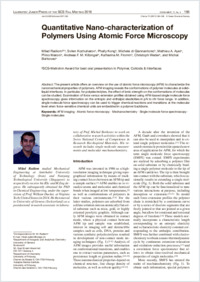Quantitative Nano-characterization of Polymers Using Atomic Force Microscopy
- Radion, Milad Department of Inorganic and Analytical Chemistry University of Geneva Sciences II 30, Quai Ernest-Ansermet CH-1211 Geneva 4, Switzerland
- Kozhuharov, Svilen Department of Inorganic and Analytical Chemistry University of Geneva Sciences II 30, Quai Ernest-Ansermet CH-1211 Geneva 4, Switzerland
- Kong, Phally Department of Chemistry University of Fribourg Chemin du Musée 9, CH-1700 Fribourg, Switzerland
- di Giannantonio, Michela Department of Chemistry University of Fribourg Chemin du Musée 9, CH-1700 Fribourg, Switzerland
- Ayer, Mathieu A. Adolphe Merkle Institute University of Fribourg Chemin des Verdiers 4, CH-1700 Fribourg, Switzerland
- Maroni, Plinio Department of Inorganic and Analytical Chemistry University of Geneva Sciences II 30, Quai Ernest-Ansermet CH-1211 Geneva 4, Switzerland
- Kilbinger, Andreas F. M. Department of Chemistry University of Fribourg Chemin du Musée 9, CH-1700 Fribourg, Switzerland
- Fromm, Katharina M. Department of Chemistry University of Fribourg Chemin du Musée 9, CH-1700 Fribourg, Switzerland
- Weder, Christoph Adolphe Merkle Institute University of Fribourg Chemin des Verdiers 4, CH-1700 Fribourg, Switzerland
- Borkovec, Michal Department of Inorganic and Analytical Chemistry University of Geneva Sciences II 30, Quai Ernest-Ansermet CH-1211 Geneva 4, Switzerland
-
2017
Published in:
- CHIMIA. - 2017, p. 195-198
English
The present article offers an overview on the use of atomic force microscopy (AFM) to characterize the nanomechanical properties of polymers. AFM imaging reveals the conformations of polymer molecules at solid– liquid interfaces. In particular, for polyelectrolytes, the effect of ionic strength on the conformations of molecules can be studied. Examination of force versus extension profiles obtained using AFM-based single molecule force spectroscopy gives information on the entropic and enthalpic elasticities in pN to nN force range. In addition, single molecule force spectroscopy can be used to trigger chemical reactions and transitions at the molecular level when force-sensitive chemical units are embedded in a polymer backbone.
- Faculty
- Faculté des sciences et de médecine
- Department
- Département de Chimie, AMI - Chimie des polymères et matériaux
- Language
-
- English
- Classification
- Chemistry
- License
-
License undefined
- Identifiers
-
- RERO DOC 289066
- DOI 10.2533/chimia.2017.195
- Persistent URL
- https://folia.unifr.ch/unifr/documents/305686
Statistics
Document views: 122
File downloads:
- Weder2017Chimia: 191
